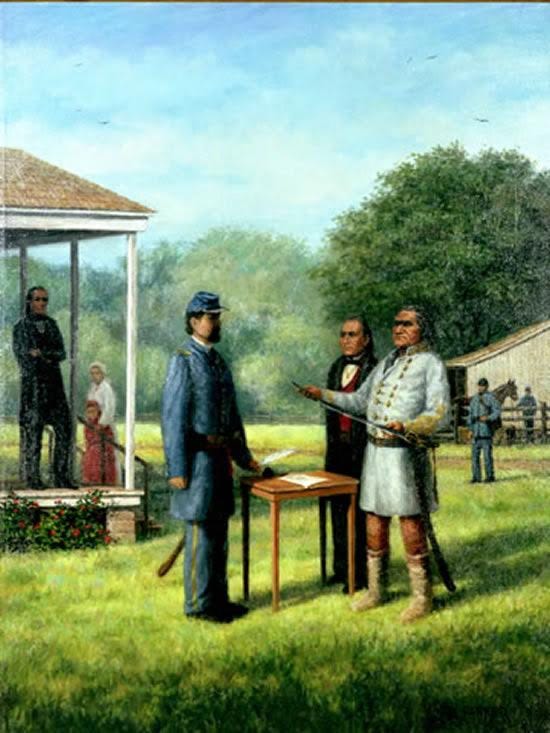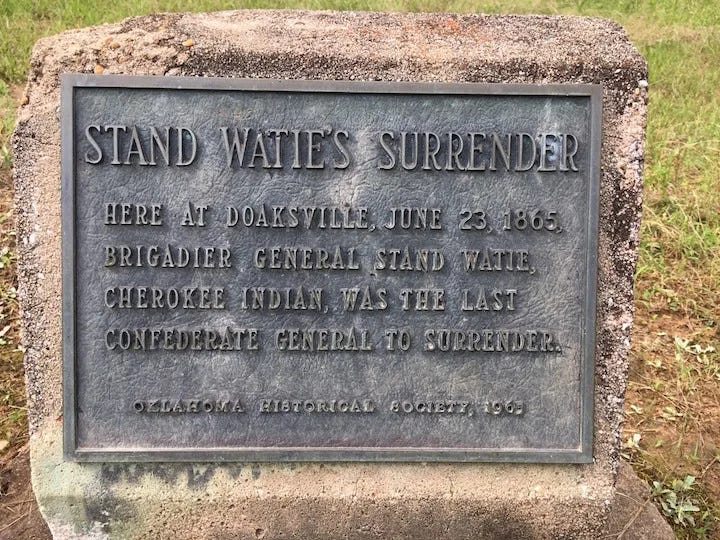"Juneteenth" Nuance
Our newest Federal holiday commemorates the freedom of the last tranche of slaves held in Galveston, Texas. But the last Confederate general - a Cherokee Indian - didn't surrender until June 23
Until US Sen. John Cornyn (R-TX) and others began pushing for America’s newest Federal holiday, "Juneteenth," I had not heard of it. It was on this day in 1865 that a Union general informed the last tranche of slaves in Galveston, TX, that they were free.

I was aware of a piece of Oklahoma history that might add a little nuance to the story. It wasn't until four days later, on June 23rd, that the last Confederate general, Stand Watie, surrendered near Fort Towson, Oklahoma, just north of the Red River and Texas. Reportedly, lacking resources, he had stopped fighting months earlier and was focused on addressing hardships and protecting the sovereignty of the Cherokee Nation. From History.com:
Watie was so committed to the Southern cause that he refused to acknowledge the Union victory in the waning months of the Civil War, keeping his troops in the field for nearly a month after Lieutenant General E. Kirby Smith surrendered the rest of the Confederacy’s Trans-Mississippi Army on May 26, 1865. A full 75 days after Robert E. Lee met with Ulysses S. Grant at Appomattox, Watie became the last Confederate general to lay down arms, surrendering his battalion of Creek, Seminole, Cherokee, and Osage Indians to Union Lieutenant Colonel Asa C. Matthews at Doaksville (Oklahoma) on June 23.
The formerly slave-owning Watie represented southern Cherokees in a new “Reconstruction” treaty with the US Government that abolished slavery in 1866 and stripped much of their tribal land. The treaty also exempted the tribe from some federal taxes. Watie retired to his Honey Creek plantation and tried to start a plug tobacco business but fell afoul of the law when he tried to undersell his Arkansas competitors.
I don't know when the slaves held by some of Oklahoma's Native American tribes were finally and fully emancipated. A federal commission (the "Dawes Commission") established by Congress 22 years later enumerated members of the "Five Civilized Tribes" and their "Freedman," or former slaves, and allocate lands seized from the tribe. It's quite a story—the commission was overwhelmed by people trying to get free land they didn't qualify for and rife with bribery and corruption. The Dawes Rolls ended after two years.
Juneteenth, as Sen. Cornyn noted during the violent summer of 2020 following George Floyd’s death, was about celebrating the end of slavery in Texas:
“As we do every year, tomorrow Texans will celebrate Juneteenth and the 155th anniversary of the end of slavery in our state. It’s an opportunity to reflect on our history, the mistakes we have made, but yet how far we’ve come in the fight for equality, and a reminder of just how far we still have to go.”
Juneteenth may celebrate the end of slavery in Texas. Still, for other places, such as the Indian Nation in Oklahoma Territory (Oklahoma would become a state in 1907), a few of its vestiges may have remained. It took a while for Union officials to reach distant rural outposts.
In other parts of the world, especially China, slavery remains alive and well.





I offer neither correction nor snark. Please give AC my best.
But of course. Typos happen... wasn't intending to be rude.
I have no idea of what of my communication here shows in the public domain.
It was just intended to pickup an old acquaintance from USAO.
I enjoy your postings